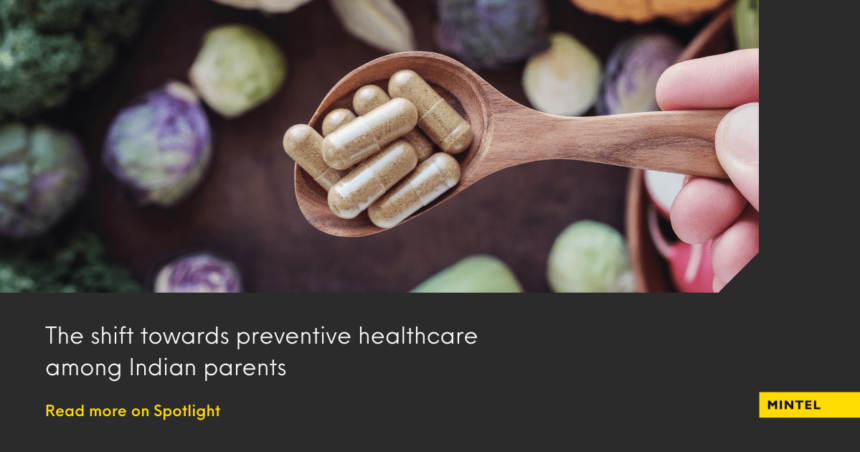In India, while the younger population is living in the present, spending a lot of money on apparel accessories, beauty products, and eating out, the more cautious are finding ways to achieve their financial goals by reducing spending, investing, or down-trading. On the other hand, parents, especially mothers, are investing more in health and wellness because of the stress associated with uncertain times and rising medical costs.
Parents turn to VMS for their health and their family’s wellbeing
In 2023, mothers, with the belief that “prevention is better than cure”, are spending more money on health and wellness products compared to 2022. According to Mintel research, 37% of urban parents believe that expenditure on healthcare will result in a more financially stable future. Additionally, 46% of parents of children in the household consume vitamins, minerals and supplements (VMS) to prevent health issues, while an equal percentage of mothers with children are spending on health and wellness products on a monthly basis.
Fathers remain actively involved in promoting preventive health measures. Specifically, 40% of fathers with children in the household spend on VMS for daily use. Additionally, 33% of fathers with children under the age of 18 prioritize purchasing foods that are rich in vitamins and minerals when shopping for food.
For brands, this is an opportunity to offer tailored VMS solutions to meet the needs of the whole family, from kids to adults. There is also a potential for pre-packaged food options to capture the interest of mothers. Incorporating herbal ingredients in VMS for stress and sleep support, focusing on children’s health, and incorporating functional ingredients in healthy packaged foods can tap into this emerging market.
As per VMS launches, “natural” and “green” claims are surging because of the long-standing faith Indians have in the power of herbal remedies.
Indians, in general, find it worthwhile to invest more in preventive healthcare
Indian consumers also now recognise the importance of leading an active lifestyle. The ongoing economic uncertainties have prompted them to adopt preventive measures to manage stress and reduce healthcare costs.
One-third of Indian consumers said their current eating habits need improvement to help them lead a healthy life, highlighting the importance of functional food and drinks.
Furthermore, 79% of Indians said it is worth paying more for food and/or drink products that help prevent lifestyle diseases, while over half agree that consuming healthy food and drink products is more effective in helping them age healthily.
Consumers are not only focusing on nutritious food and drinks but also exploring health monitoring gadgets and skin sensors. Brands can enhance customer engagement by making fitness and health-related goals enjoyable, as seen in the example of Cult.fit hosting house parties for health enthusiasts.
Cult.Fit’s dance fitness classes (India); Source: Cult.fit
Financial optimism and economic outlook
Amid the current economic crisis, hope is emerging for Indian consumers, with 39% of them in a healthy financial position and 43% managing to remain in an “OK” state according to Mintel APAC Economic Tracker (client-only link). This optimistic outlook is seen among those aged 35-54.
The current financial optimism is highlighted by the Indian economic activity gaining momentum, with a revised GDP growth rate of 6.7% for 2023, reflecting a robust 7.8% growth in the first quarter of the fiscal year 2023-2024.
Apart from economic factors, Indians are also burdened with concerns over climate change, from heat waves to heavy flooding during monsoon, disrupting food security due to the erratic nature of droughts and floods. The Indian government is responding by promoting millet-based sustainable regenerative agriculture practices to meet UN Sustainable Development Goals. Millets being rain-fed crops, do not require standing water in their fields. They also require less fertilizer and pesticide, unlike mainstream cereals, for cultivation.
This approach not only addresses food security but also aligns with consumers’ growing health-conscious mindset.
What we think
In summary, the shift towards preventative healthcare presents a dynamic landscape for brands to align with evolving consumer priorities and contribute to a healthier and more secure future for Indian families.
Explore our extensive Indian Consumer Research, or contact us today.








